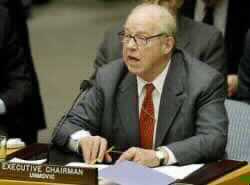US, Britain Push UN Resolution Despite Opposition
20/02/2003| IslamWeb
 Faced with stiff opposition, the United States and Britain intend to introduce a resolution within a week seeking U.N. authorization for a war against Iraq, both countries said on Wednesday. But diplomats said the Bush administration was not likely to push the resolution to a vote until well into the first week of March after another report from U.N. weapons inspectors, an indication that a possible attack against Iraq will not take place until the second week of next month at the earliest.
Faced with stiff opposition, the United States and Britain intend to introduce a resolution within a week seeking U.N. authorization for a war against Iraq, both countries said on Wednesday. But diplomats said the Bush administration was not likely to push the resolution to a vote until well into the first week of March after another report from U.N. weapons inspectors, an indication that a possible attack against Iraq will not take place until the second week of next month at the earliest.
The resolution may include a deadline for Iraq to show it is voluntarily giving up any weapons of mass destruction it may have, said Britain's U.N. Ambassador Sir Jeremy Greenstock.
"Explicitly or implicitly I do expect that because time will run out as time always does," Greenstock told reporters, adding: "There is a menu of options."
But some hawks in the Bush administration oppose a deadline in the resolution and want the United States and Britain to issue a separate one on their own, diplomats said.
The resolution, which had been expected to be circulated on Wednesday, was delayed while President Bush and Prime Minister Tony Blair agreed on its terms. The two leaders spoke by telephone for 30 minutes, the White House said late on Wednesday.
The draft resolution is expected to be simple and say Iraq is in "further material breach" of a Nov. 8 Security Council resolution giving Baghdad one last opportunity to disarm or face serious consequences. The words "material breach" can be used as legal justification for military force.
U.S. STILL LACKS SUPPORT FOR WAR RESOLUTION
The United States still does not have the minimum nine votes in the 15-member Security Council needed to adopt a resolution. It also faces a possible veto from permanent council members France, Russia and China, who want inspections to continue for a while longer than the U.S. military timetable seems to allow.
But the United States appears willing to work for the nine votes and dare the big powers to veto.
France's support extended well outside of the 15-member council. Opposition to the war reached a crescendo among dozens of U.N. members from all parts of the globe, with South Africa, Brazil, New Zealand, India and all Middle East countries arguing that inspections should continue.
Of the 27 envoys that spoke on Tuesday, only four supported the U.S. position -- Australia, Japan, South Korea and Peru.
Among the 36 delegates who spoke on Wednesday, Washington received varying degrees of support from about half.
BENCHMARKS FOR IRAQ?
Blix is to give a written update to the Security Council at the end of the month or early in March on the inspectors' progress and Iraq's cooperation. Several council members, including Britain, France and possibly the United States, want him to include "benchmarks" of key unresolved questions that Iraq has to fulfill.
The Bush administration also was weighing such benchmarks as part of the resolution in an effort to persuade reluctant council members to support military force. But diplomats said it no longer was considering it in the text.
BLIX TO TELL IRAQ TO DESTROY MISSILES
In a related development, chief U.N. weapons inspector Hans Blix decided to tell Iraq to destroy its al-Samoud 2 missiles for exceeding the range allowed by the United Nations. But he has not yet determined whether the rocket engines that drive them should also be demolished, diplomats said.
Blix is expected to write a letter to Baghdad officials shortly after weapons inspectors complete their inventory of sites assembling missiles, launchers and other components, which they have been scrutinizing nearly every day this week.
The United States considers the missile controversy a "smoking gun," especially if Iraq balks at the destruction. But most other council members have not seized on this issue as a make-or-break factor. Iraq, which had voluntarily declared the missiles to U.N. inspectors, says they do not exceed limits when weighted with a payload
PHOTO CAPTION
A U.S.-British resolution seeking U.N. authorization for war against Iraq may not be pushed to a vote before early March, after another report by chief weapons inspector Hans Blix, diplomats said February 19, 2003. (Peter Morgan/Re
www.islamweb.net
